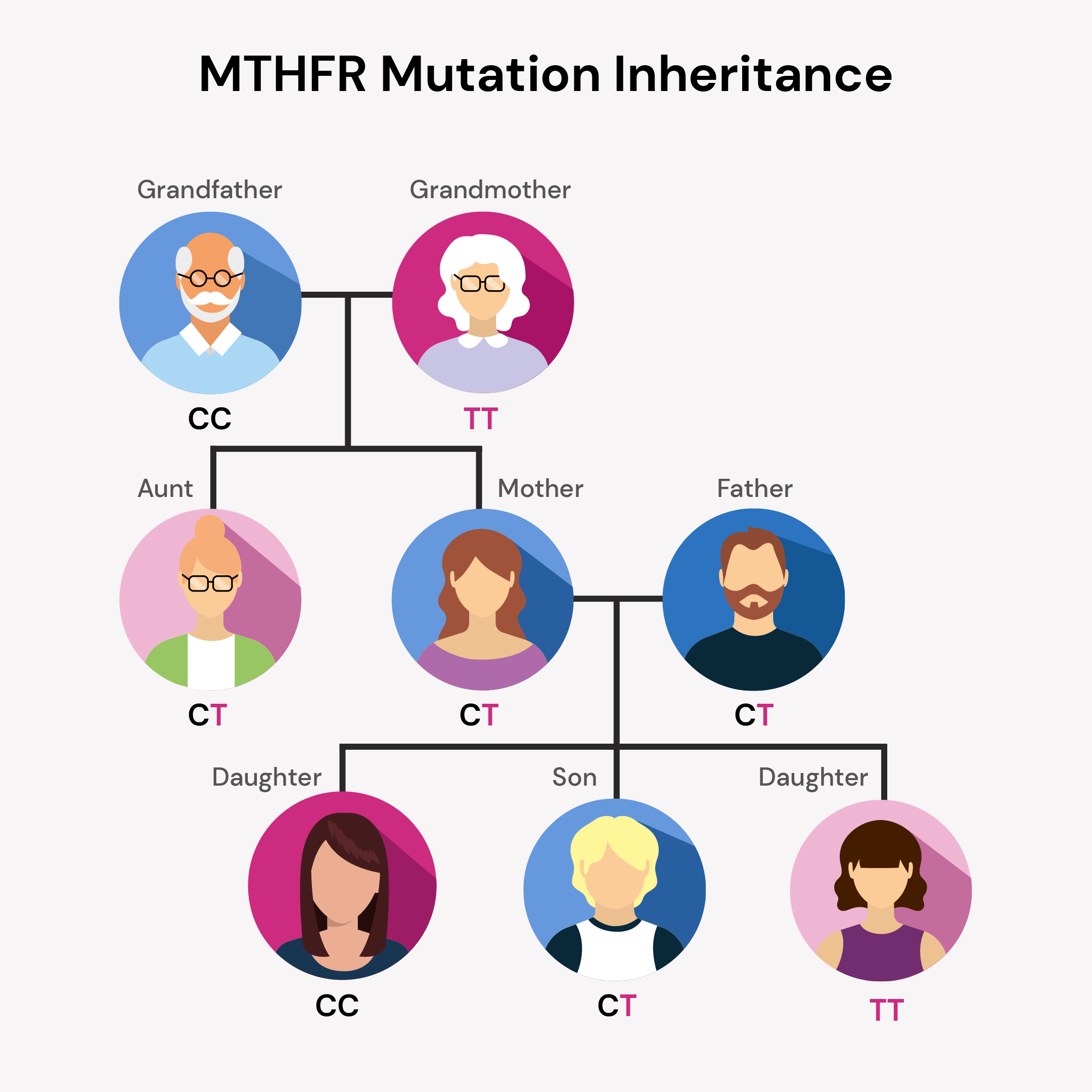If you’ve ever felt unusually tired, anxious, or just a bit “off,” there’s a chance it’s more than just a rough week. For many people, the root of these symptoms traces back to a small genetic variation known as the MTHFR gene mutation. While it might sound like a complicated term from a biology textbook, this gene plays a very real role in how your body processes key nutrients, particularly certain B vitamins.
In this post, we’ll walk you through what the MTHFR gene does, how the mutation works, why it matters, and how the right multivitamin can help you fill in the nutritional gaps.

What Is the MTHFR Gene?
The MTHFR gene helps your body convert folate (Vitamin B9) into methylfolate, the active form your cells can use. It also plays a key role in how your body processes Vitamins B6 and B12, which work together to convert homocysteine into methionine. This process supports everything from detoxification and DNA repair to brain and cardiovascular health.
Sounds pretty important, right? It is.
When the MTHFR gene functions normally, you’re able to properly metabolize folate and other B Vitamins, keeping your body balanced. But if you carry a mutation on this gene, things can get a bit more complicated.

What Is the MTHFR Gene Mutation?
The MTHFR gene mutation is a change (or variant) in the genetic code that can reduce how well this enzyme works. There are two common types of MTHFR gene variants: C677T and A1298C. It’s possible to have one or both.
If you inherit a mutation from one parent, you’re called a “heterozygous” carrier. If you inherit it from both, you’re “homozygous,” which usually results in a more pronounced effect.
Research suggests that up to 40% of the population may carry some form of the MTHFR gene mutation, but many people have no idea.

Why Does This Matter?
If you carry this mutation, your body may struggle to convert synthetic folic acid (found in many conventional supplements and fortified foods) into the active form it actually needs, methylfolate. The same goes for other B Vitamins like Vitamin B12, which needs to be in the form of methylcobalamin to be effectively absorbed.
When your body can’t properly use these vitamins, it can lead to a wide range of symptoms and health concerns, such as:
- Fatigue or low energy
- Brain fog or memory issues
- Anxiety and mood swings
- Headaches or migraines
- Hormonal imbalances
-
Elevated homocysteine levels, which may increase heart disease risk
These symptoms can be frustrating, especially when you’re doing everything “right,” like eating well, exercising, and taking your vitamins.

The Role of B Vitamins in Methylation
Methylation is a process that happens in every cell of your body, thousands of times per second. It’s how your body turns genes on and off, detoxifies chemicals, builds neurotransmitters, and keeps your DNA in check.
And guess what fuels this essential process? That’s right. B Vitamins.
Without enough active B Vitamins, especially B9 (folate), B6, and B12, methylation can slow down, leaving your body vulnerable to everything from low mood to chronic inflammation.
If you carry the MTHFR gene mutation, your body needs methylated forms of these vitamins to keep things running smoothly.

Choosing the Right Multivitamin for MTHFR
This is where things get important for your supplement routine. Many multivitamins still use synthetic forms like folic acid or cyanocobalamin (a form of Vitamin B12), which can be ineffective, or even harmful, for those with the MTHFR gene mutation.
Instead, you want to look for a multivitamin that includes:
- Methylfolate (instead of folic acid)
- Methylcobalamin (instead of cyanocobalamin)
- Pyridoxal-5-phosphate (the active form of Vitamin B6)
- Other bioavailable nutrients that support methylation, such as choline, riboflavin (B2), and magnesium
One example of a well-formulated option is the P.S. Longevity Multivitamin, which was designed with bioavailability in mind. It includes methylated B Vitamins, clean ingredients, and no unnecessary fillers like calcium, iron, or synthetic additives, making it suitable for both men and women, including those with MTHFR gene variants.
In addition to methylated B Vitamins, each respective ingredient is in its most bioavailable form. So your body can actually use what’s in the formula.

Should You Get Tested?
If you suspect you may have the MTHFR gene mutation, you can confirm it with a simple genetic test. Many at-home DNA kits (like 23andMe) can provide this information, or your healthcare provider may order a test for you.
That said, some people choose to skip testing and simply take a methylated multivitamin, especially if they’re experiencing symptoms related to poor B Vitamin absorption.

Everyday Tips for Supporting MTHFR
Whether or not you’ve tested positive for the mutation, there are a few smart ways to support your body:
- Focus on real food: Aim for a diet rich in naturally folate-rich foods like leafy greens (spinach, kale, romaine), legumes (lentils, chickpeas), eggs, and liver. Unlike synthetic folic acid, these whole foods provide folate in a form your body can use.
- Avoid folic acid: This synthetic version of folate is common in fortified cereals, breads (anything that says ‘fortified’ or ‘enriched’ contains folic acid), and many lower-cost supplements. If you have an MTHFR mutation, your body may struggle to convert it effectively. Instead, look for supplements that list “methylfolate” or “L-5-MTHF” on the label.
- Choose a clean multivitamin: Not all multis are created equal. Select one that uses bioavailable forms of nutrients, like methylated B12 and folate, so your body doesn’t have to do the heavy lifting. P.S. Longevity Multivitamin, for example, is specially designed to meet these needs.
- Watch your stress levels: Long-term stress can disrupt methylation, the process your body uses to manage everything from energy production to detoxification. Incorporating daily stress-relief strategies like mindfulness, exercise, and quality sleep can support your body’s natural balance.
- Limit alcohol: Regular alcohol use interferes with folate absorption and places extra strain on methylation pathways. If you're supporting MTHFR function, consider cutting back or eliminating alcohol where possible.
These everyday habits can go a long way in supporting your health, especially if you're one of the many people with this common genetic variation.

Final Thoughts
The MTHFR gene mutation may sound like a minor genetic quirk, but its effects on how your body processes B Vitamins can ripple through your entire health picture—from mood to metabolism to energy.
By understanding how this gene works and choosing the right nutrients to support your body, you can take back control. Whether you’ve tested for the MTHFR gene or not, investing in a clean, methylated multivitamin, like P.S. Longevity Multivitamin, can help ensure you’re actually absorbing the vitamins you take each day.
Because at the end of the day, it’s not just about what’s in your supplement. It’s about what your body can do with it.
Ready to level up your longevity?
Try the Longevity Anti-Aging Multivitamin, packed with antioxidants and optimized for absorption, available here.
Click the button below and get 10% off when you use the discount code: "LONGEVITY10"
P.S.
Check out how you'll know if your multivitamin is actually working.




